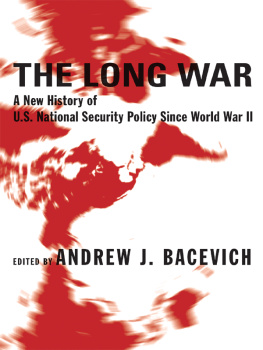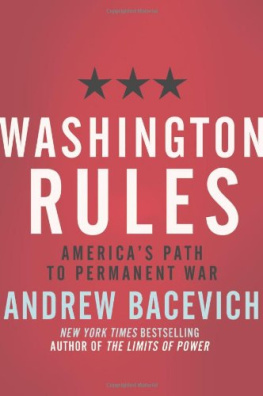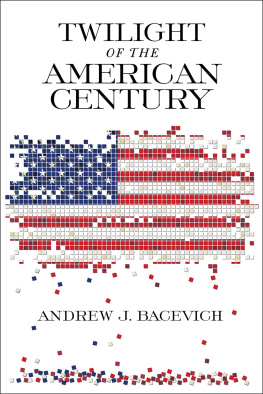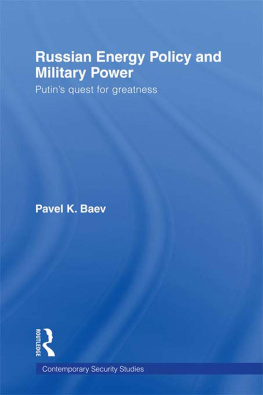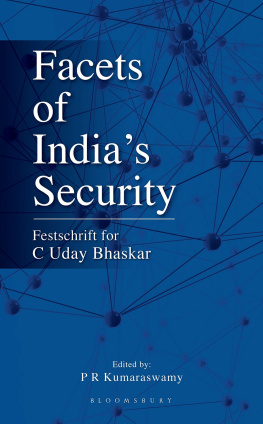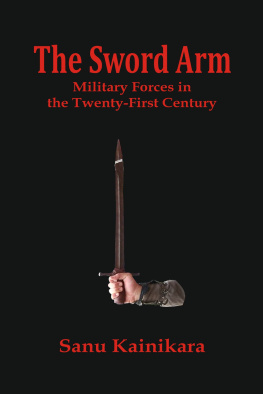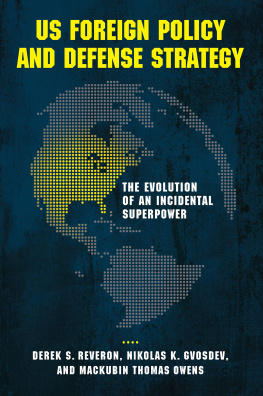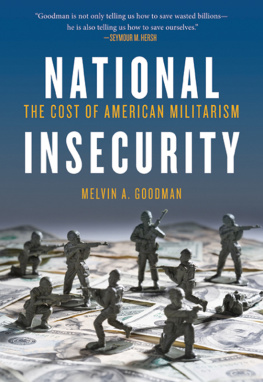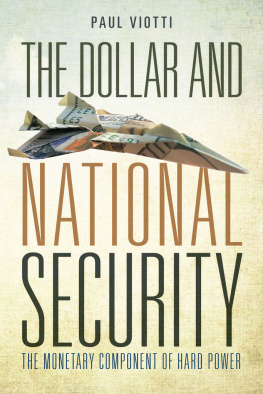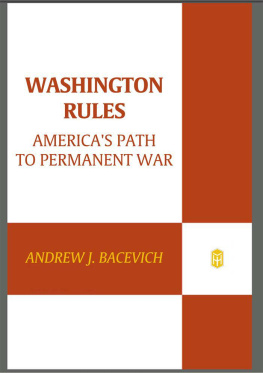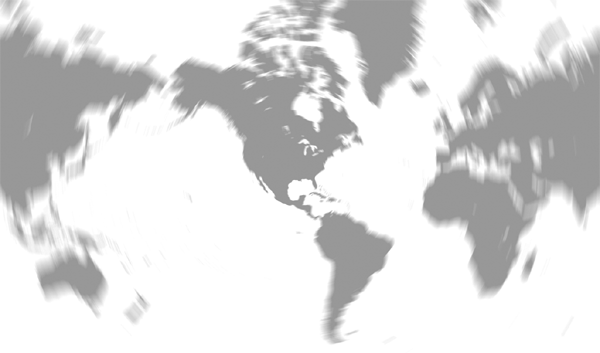THE LONG WAR
A New History of U.S. National Security Policy Since World War II
A NDREW J. B ACEVICH , Editor
C OLUMBIA U NIVERSITY P RESS New York
Columbia University Press
Publishers Since 1893
New York Chichester, West Sussex
cup.columbia.edu
Copyright 2007 Columbia University Press
All rights reserved
E-ISBN 978-0-231-50586-4
Library of Congress Cataloging-in-Publication Data
The long war : a new history of U.S. national security policy since World War II / Andrew J. Bacevich, editor.
p. cm.
Includes index.
ISBN 9780231131582 (cloth : alk. paper)ISBN 9780231505864 (e-book)
1. National securityUnited States. 2. United StatesMilitary policy. 3. United StatesPolitics and government19451989 4. United StatesPolitics and government1989 I. Bacevich, A. J. II. Title.
UA23.L685 2007
355.033573dc22 2006037804
A Columbia University Press E-book.
CUP would be pleased to hear about your reading experience with this e-book at .
CONTENTS
1. LIBERATION OR DOMINANCE?
The Ideology Of U.S. National Security Policy
4. SHIELD AND SWORD
U.S. Strategic Forces and Doctrine Since 1945
5. ELUSIVE BARGAIN
The Pattern of U.S. Civil-Military Relations Since World War II
6. THE EVOLUTION OF THE NATIONAL SECURITY STATE
Ubiquitous and Endless
8. THE MILITARY-INDUSTRIAL COMPLEX
Lobby and Trope
9. PAYING FOR GLOBAL POWER
Costs and benefits of Postwar U.S. military Spending
11. AMERICAN INSECURITY
Dissent from the Long War
12. THE GOOD WAR
National Security and American Culture
A NDREW J. B ACEVICH
Growing up in the Midwest during the 1950s and early 1960s, I came to understand the narrative of contemporary history and the narrative of the Cold War as one and the same. That the Cold War provided the organizing principle of the age was self-evident, even to a young boy. Catch the headlines on WGN, read the Chicago Tribune, flip through an occasional issue of Time or Life, and the rest was easy: the eras great antagonismsthe United States vs. the Soviet Union, West vs. East, Free World vs. Communist bloctold you pretty much everything you needed to know.
In this sense, if the Cold War was not without its anxious moments, it also served to impart order and clarity to American life. The anti-Communist crusade provided an authoritative template, equally useful for interpreting events abroad and developments at home. View the world through the Cold War prism, and discriminating between friend and foe, good and evil, important priorities and marginal ones became childs play.
Further enhancing the Cold Wars standing was the disparity between what we knew about the way it began and what we were able to project about its likely course and conclusion. Whereas observers fixed the origins of the conflict with reassuring specificity, its scope and duration appeared ominously indefinite. We knew (or thought we knew) exactly when and how the Cold War had come about; we were clueless about when and how it was going to end.
As one consequence, the past became largely irrelevant. When World War II ended, history had (apparently) begun anew, thereby endowing the Cold War with an aura of remarkable singularity: Americans were living in a time the like of which humankind had never before encountered. Although events that had occurred prior to 1946 or 1947 might retain a certain quaint interest, few of them had much to say about the daunting challenges now facing the nation. Munich, Pearl Harbor, Yalta, and Hiroshima were the exceptions that proved the rule: events shorn of historical context and pressed into service as dark parables teaching universal truths.
As a second consequence, crisis became a permanent condition. In Cold War America, urgency, danger, and uncertainty permeated public discourse. Presidents competed with one another in proclaiming states of national emergency that seemingly never got revoked. All of this had a powerful disciplining effect. In 1917, an acerbic Randolph Bourne had observed that In a time of faith, skepticism is the most intolerable of insults. Americans in the decades after World War II embraced an especially compelling faith; for the great majority of citizens, skepticism became not simply intolerable but unimaginable.
The essence of that faith, to which all but a handful of marginalized contrarians devotedly adhered, was contained in twin convictions. According to the first, the United States was a nation under siege, beset by dire threats, its very survival at risk. According to the second, only the capacity and willingness to assert all of the instruments of hard power, instantly and without hesitation, could keep Americas enemies at bay.
These two notions describe the essence of the national security paradigm that has shaped U.S. policy for well over a half-century. From the late 1940s through the 1980s, responding to the threat posed by international communism meant placing a premium on maintaining, threatening, and at times using force. From this imperative there evolved the various components of the national security state: a large standing military establishment scattered around the world; a vast arsenal of strategic weapons kept ready for instant employment; intelligence agencies operating beyond public scrutiny in a black worldthe entire conglomeration tended by an army of devoted bureaucrats planning, managing, budgeting, and elevating group-think to a fine art. To lend a veneer of rationality to the activities of this sprawling apparatus, successive administrations devised doctrines with imposing names. For Harry Truman there was Containment; for Dwight D. Eisenhower, Massive Retaliation; for John F. Kennedy, Flexible Response. With anxious citizens looking to the commander-in-chief to keep them safe, presidents accruedand exercisedan ever-expanding array of prerogatives. In the process, the legislative branch by-and-large functioned as an enabler and drifted toward irrelevance.
With the Congress deferential if not altogether supine on matters related to national security, politics centered increasingly on the question of who controlled the Oval Office. More often than not, the key to winning the White House lay in scare-mongering, successful candidates from Eisenhower onward letting it be known that in a dangerous world electing their opponent was to invite the barbarians through the gates or risk the cataclysm of World War III.
Although the social and cultural upheaval associated with the 1960s, reinforced by the disaster of Vietnam, briefly opened up a window for skepticism, the overriding requirements of national security soon slammed that window shut. Americans today remember the Sixties as an era of profound and enduring change. When it came to national security policy, however, the impact proved to be ephemeral and insignificant.
Within a half-decade after the fall of Saigon, orthodoxy had reasserted itself: with the election of Ronald Reagan to the presidency, America was once again standing tall. In the context of domestic politics, the phrase Jimmy Carter took its place alongside Munich and Yalta, warning of the fate certain to befall any politician insufficiently alive to the imperative of basing U.S. policy on vigilance, assertiveness, and unassailable military superiority.

